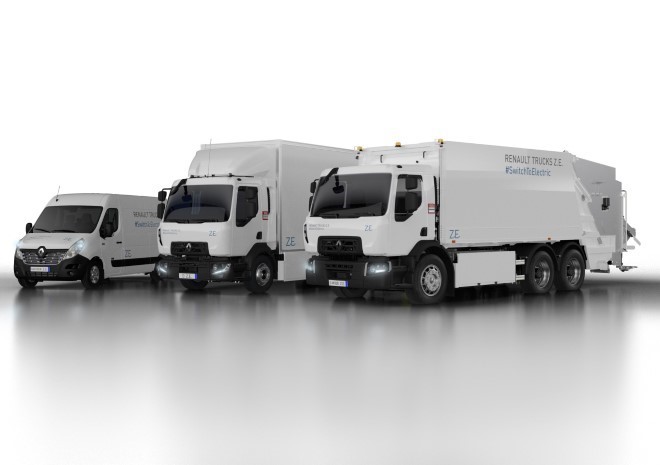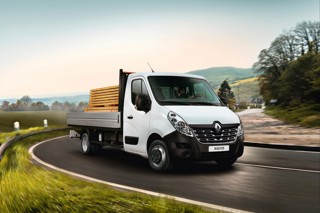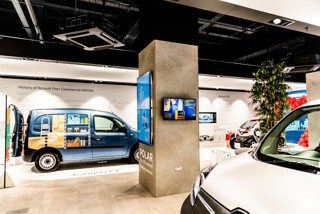Renault Trucks has ended 2018 with a total volume of 54,868 vehicles invoiced, up 10% on the previous year.
In a buoyant European market, the French manufacturer has strengthened its positions and increased its 16-tonne-plus market share by 0.2 points.
In 2018, Renault Trucks recorded its fourth consecutive year of sales growth. The manufacturer has announced a rise of 7.6% in medium and heavy duty vehicles (MHDVs), and 15% in light commercial vehicles (LCVs).
Breakdown in invoicing per destination
- Europe (excluding France): 26,830 units invoiced (+13.5%)
- France: 23,581 units invoiced (+10.1%)
- Rest of the world: 4,457 units invoiced (-8.8%)
Significant growth in volume in Europe
In a dynamic European market for vehicles over 6 tonnes (up 4.2%), deliveries of Renault Trucks vehicles are up 7.6%. This has led to a slight increase in the French manufacturer’s market share, up 0.1 point to 8.5%.
In the over 16-tonne segment, Renault Trucks’ market share in Europe is up 0.2 points, at 8.9%. For vehicles between 6 and 16 tonnes, market share is down 0.3 points (6.2%). Registrations were down 3.8% due to the stoppage of the Renault Trucks D cab 2m model. On a like-for-like basis, however, penetration remains identical.
Renault Trucks has strengthened its position as leader in its home market, with a 28.1% market share.
International sales marked by an upturn in Africa
Deliveries of Renault Trucks vehicles have fallen 8.8% internationally, with 4,457 trucks invoiced. This downturn can be explained by the introduction of import quotas in Algeria in 2018.
The manufacturer is particularly active in Africa, where sales have grown 25% in 2018. In French-speaking Africa, Renault Trucks holds 20% of the premium range market (+1 point).
In 2018, the constructor also recorded good performance in Turkey (+2.1 points with 5.8% of MS) and in the Middle East (+1.1 point with 6.4% MS).
A record 23% increase of for Renault Trucks used trucks
In 2018, Renault Trucks recorded a record increase in sales of used trucks, with 8,500 invoiced vehicles, up 23%.
Used trucks service offers are also performing well, notably due to the selection structure warranty, with a penetration rate of 18%, up 6 points.
Used vehicles represent a strategic sector for Renault Trucks, it said. In 2017, the manufacturer opened a used trucks factory at its Bourg-en-Bresse plant to recondition its used vehicles.
In 2018, 400 used trucks were reconditioned there to meet customer requirements (compared to 230 in 2017).
The aim is for vehicles from the used trucks factory to eventually represent 10% of total sales of used vehicles. After the Range T X-Road, Renault Trucks launched another model from its Used Trucks Factory in 2018, the Range T P-Road, a tractor converted into a rigid truck.
Aftersales: spare parts turnover up 5%
Renault Trucks aftersales division has reported steady progress of 5% in its spare parts turnover and a healthy increase in the sales of its maintenance contracts.
With 32,000 vehicles under contract, the penetration rate of maintenance contracts grew by 5 points in 2018 to reach 23.6% (29% if Clovis Location contracts are included); 60,000 vehicles now benefit from a Renault Trucks maintenance contract or extended warranty.
It is of note that Renault Trucks offers transporters ideal protection for operating with complete peace of mind, since the constructor has extended its warranty on spare parts fitted by an approved Renault Trucks service centre to 2 years, without any mileage restrictions.
Renault Trucks preparing for the future
Fuel savings and reducing CO2 emissions have always been a core concern for Renault Trucks. The manufacturer is therefore investing fully in complying with the limits set by the EU as regards CO2 emissions.
At the end of 2018, Renault Trucks announced the launch of the 2019 versions of the T, D and D Wide models, designed to reduce fuel consumption by up to 7% compared to previous versions.
Renault Trucks is also continuing its research into improving the efficiency of diesel vehicles, with its Optifuel Lab 3 laboratory vehicle. The aim is to reduce fuel consumption by 13% for a full heavy vehicle unit by 2020.
Renault Trucks will also be launching its D and D Wide Z.E. electric trucks in 2019, manufactured in its Blainville-sur-Orne factory. The Renault Master Z.E., on the other hand, is already being distributed in the Renault Trucks network.























Login to comment
Comments
No comments have been made yet.